Innovation grounded in science is at the heart of Brandon Bioscience. Located in Tralee, Co Kerry, for over 23 years the company has been producing crop biostimulant products extracted from the common brown seaweed Ascophyllum nodosum.
Brandon Bioscience currently employs 20 staff, with sales in over 40 countries and an annual turnover of €10m. The company has been producing biostimulant products for decades now, and its next generation of seaweed derived products caught the attention of this year’s Innovation Arena judges.

James Maloney of Enterprise Ireland presenting Paddy Casey of Target Fertilisers and Oliver Kiernan of Brandon Bioscience with Innovation Arena Awards this week.
The company has perfected the process of identifying, isolating, extracting and concentrating specific bio-compounds from seaweed to create a range of highly effective biostimulant products with targeted properties.
One of these products, called PSI362, allows for more efficient use of nitrogen by crops, allowing up to a 20% reduction in nitrogen rates without affecting crop yield.
It was this innovation which allowed Brandon Bioscience to claim top price at this year’s Enterprise Ireland’s Innovation Arena Awards.
The Irish Farmers Journal recently spoke to David Barton and Oliver Kiernan about the new range of biostimulants as well as its manufacturing process.
Biostimulants
Ascophyllum nodosum (Asco), also known as Knotted Wrack, is one of the most commonly found brown seaweeds in the Irish shoreline.
The algae has evolved to thrive in its challenging tidal environment and, as such, is packed with many thousands of unique biochemical compounds and properties. This is why it has become such an attractive source material for plant biostimulant producers.
Plant biostimulants have gained significant attention from scientists, the industry, and growers over recent years as more sustainable solutions for crop production are sought. The global biostimulant industry is big business, accounting for €2.7bn in sales in 2019 and is expected to reach €7.8bn by 2027.
As pressure mounts to improve the sustainability of agriculture while reducing the reliance on pesticides and synthetic fertiliser, biostimulants are mooted as playing a key role.
Twenty-three years in the making
Brandon Bioscience has firmly set itself apart from other producers of seaweed-based extracts with their unique Plant Signal Induction (PSI) Precision Technology which comes with a powerful provenance based on 23 years of research.
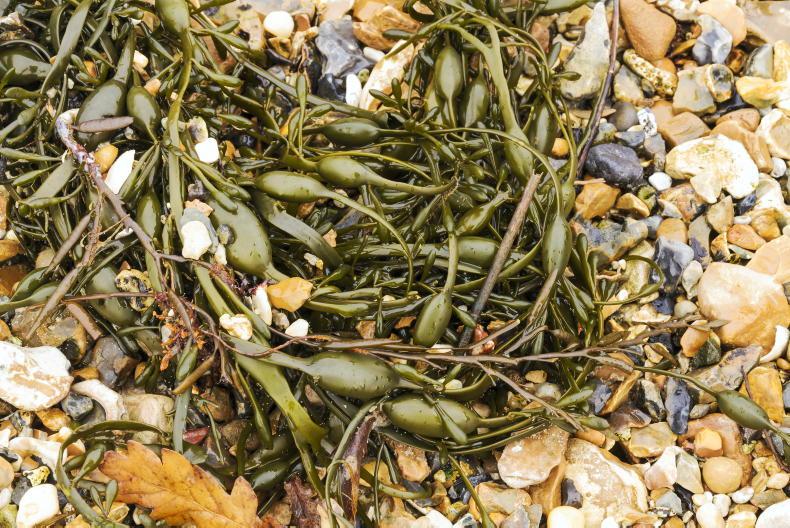
Ascophyllum nodosum contains thousands fo unique biocompounds.
PSI essentially means moving away from generic seaweed extracts to more functional and specific extracts that offer improved performance and reliability.
The journey to develop the PSI process began eight years ago and involved identifying, characterising (chemically, biologically and genetically) and understanding the relationship between specific bio-compounds contained in seaweed and their function in plants.
The proprietary manufacturing process involves extracting novel marine biomolecules from seaweed which are contained in long-chain biopolymers. These biopolymers are relatively inactive. They then transform these into shorter-chain oligomers, thus making them specific, bioactive and concentrated.
“This ability to fine-tune the bioactivity of our products to specific agricultural challenges means it’s almost like having the power of a synthetic with the sustainability of a biological,” explains David.
PSI Precision is a platform technology that has resulted in a range of products, some of which are available and some of which are in development. These include PSI759, which is an engineered biomolecule complex designed to reduce pod shatter and increases yield in podded crops via a natural physiological mode of action.

PSI362 allows for up to a 20% reduction in nitrogen rates without impacting crop yield.
Another biomolecule newly developed is PSI433, designed to improve crop water uptake, retention and use efficiency (WUE) under both normal and water deficit conditions.
PSI475 is designed to improve yields of crops under salt stress conditions by directing the physiology of these crops to reduce ion toxicity and stimulate osmotic stress tolerance.
PSI494 helps to protect plants from chronic heat stress events (eg >35°C for greater than seven days) by triggering the accumulation of viable pollen, soluble sugars and heat shock proteins (HSPs) in flowers to increase fruit set and improve yield.
However it’s PSI362 which is particularly applicable to Irish readers given its ability to improve plants’ nitrogen use efficiency.
20% reduction in Nitrogen
PSI362 is another engineered biomolecule complex derived from Asco seaweed which significantly improves a crop’s nitrogen use efficiency (NUE). It works by activating select nitrogen transport and assimilation genes in crops to enhance the uptake, transport and assimilation of this nutrient.
Little was known on how Asco extracts (ANEs) can influence mechanisms of nitrogen uptake and assimilation in crops to allow reduced nitrogen application. Subsequent research work which was published this year in the journal Frontiers in Plant Science found that NUE was increased by between 29.85–60.26% in barley crops with nitrogen rates of just 75% when treated with PSI362.
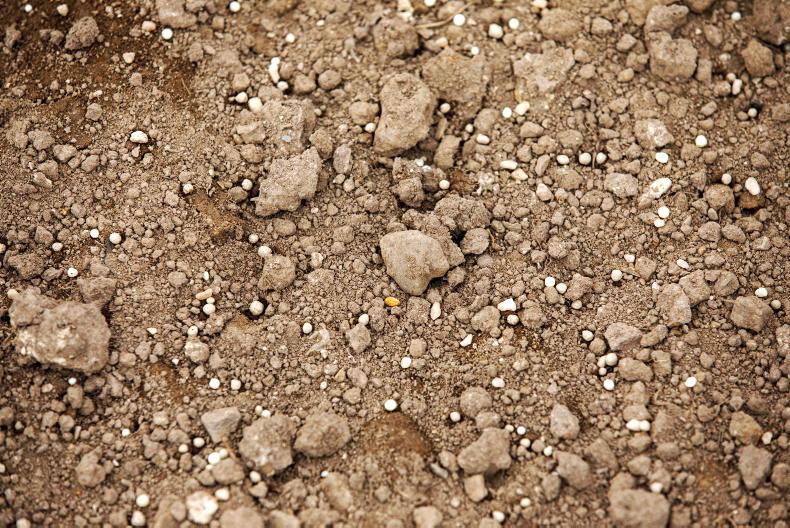
Irish farmers will soom come under stirct new rules on spreading fertiliser rates under the EU Green Deal.
When PSI362 was incorporated as a coating to the granular nitrogen fertiliser calcium ammonium nitrate (CAN) and applied to barley crops, nitrate uptake levels in the barley crop were considerably higher 22 days after application.
The magnitude of the nitrogen reduction achieved with PSI362 without compromising yield suggests it can have a significant role in delivering the EU target of a 20% reduction in nitrogen use in agriculture.
Terra fertilisers
Brandon Bioscience has worked closely with a number of partners to develop a commercial product. One of these is Wexford-based Target Fertilisers, who supply around 20% of the market. Together the companies have developed a new Terra fertiliser range.
The Terra range of granular nitrogen is coated with PSI362 and has been trialled over the last five years, with multiannual field trials in barley, wheat, oilseed rape and grass (silage and grazing).
The fertiliser range was soft-launched to the market in 2021 and is currently available for purchase in the Irish market. The customers being targeted are farmers engaged in all agricultural enterprises in all markets.
The Terra range of fertiliser has a reduced nitrogen content of 22% so physical application rates remain the same. With the PSI362 based coating however, crop yields are claimed to remain as consistent as with conventional nitrogen.
“By providing farmers with reliable, sustainable nitrogen we enable farmers meet their production, revenue, and environmental goals”, according to Target Fertiliser’s Managing Director Walter Furlong.
More work is still ongoing into the mode of action at a basic plant science level to understand the optimal conditions for efficacy in various crop types and conditions but PSI362 is sure to play an important role in crop nutrition well into the future.
Innovation grounded in science is at the heart of Brandon Bioscience. Located in Tralee, Co Kerry, for over 23 years the company has been producing crop biostimulant products extracted from the common brown seaweed Ascophyllum nodosum.
Brandon Bioscience currently employs 20 staff, with sales in over 40 countries and an annual turnover of €10m. The company has been producing biostimulant products for decades now, and its next generation of seaweed derived products caught the attention of this year’s Innovation Arena judges.

James Maloney of Enterprise Ireland presenting Paddy Casey of Target Fertilisers and Oliver Kiernan of Brandon Bioscience with Innovation Arena Awards this week.
The company has perfected the process of identifying, isolating, extracting and concentrating specific bio-compounds from seaweed to create a range of highly effective biostimulant products with targeted properties.
One of these products, called PSI362, allows for more efficient use of nitrogen by crops, allowing up to a 20% reduction in nitrogen rates without affecting crop yield.
It was this innovation which allowed Brandon Bioscience to claim top price at this year’s Enterprise Ireland’s Innovation Arena Awards.
The Irish Farmers Journal recently spoke to David Barton and Oliver Kiernan about the new range of biostimulants as well as its manufacturing process.
Biostimulants
Ascophyllum nodosum (Asco), also known as Knotted Wrack, is one of the most commonly found brown seaweeds in the Irish shoreline.
The algae has evolved to thrive in its challenging tidal environment and, as such, is packed with many thousands of unique biochemical compounds and properties. This is why it has become such an attractive source material for plant biostimulant producers.
Plant biostimulants have gained significant attention from scientists, the industry, and growers over recent years as more sustainable solutions for crop production are sought. The global biostimulant industry is big business, accounting for €2.7bn in sales in 2019 and is expected to reach €7.8bn by 2027.
As pressure mounts to improve the sustainability of agriculture while reducing the reliance on pesticides and synthetic fertiliser, biostimulants are mooted as playing a key role.
Twenty-three years in the making
Brandon Bioscience has firmly set itself apart from other producers of seaweed-based extracts with their unique Plant Signal Induction (PSI) Precision Technology which comes with a powerful provenance based on 23 years of research.

Ascophyllum nodosum contains thousands fo unique biocompounds.
PSI essentially means moving away from generic seaweed extracts to more functional and specific extracts that offer improved performance and reliability.
The journey to develop the PSI process began eight years ago and involved identifying, characterising (chemically, biologically and genetically) and understanding the relationship between specific bio-compounds contained in seaweed and their function in plants.
The proprietary manufacturing process involves extracting novel marine biomolecules from seaweed which are contained in long-chain biopolymers. These biopolymers are relatively inactive. They then transform these into shorter-chain oligomers, thus making them specific, bioactive and concentrated.
“This ability to fine-tune the bioactivity of our products to specific agricultural challenges means it’s almost like having the power of a synthetic with the sustainability of a biological,” explains David.
PSI Precision is a platform technology that has resulted in a range of products, some of which are available and some of which are in development. These include PSI759, which is an engineered biomolecule complex designed to reduce pod shatter and increases yield in podded crops via a natural physiological mode of action.

PSI362 allows for up to a 20% reduction in nitrogen rates without impacting crop yield.
Another biomolecule newly developed is PSI433, designed to improve crop water uptake, retention and use efficiency (WUE) under both normal and water deficit conditions.
PSI475 is designed to improve yields of crops under salt stress conditions by directing the physiology of these crops to reduce ion toxicity and stimulate osmotic stress tolerance.
PSI494 helps to protect plants from chronic heat stress events (eg >35°C for greater than seven days) by triggering the accumulation of viable pollen, soluble sugars and heat shock proteins (HSPs) in flowers to increase fruit set and improve yield.
However it’s PSI362 which is particularly applicable to Irish readers given its ability to improve plants’ nitrogen use efficiency.
20% reduction in Nitrogen
PSI362 is another engineered biomolecule complex derived from Asco seaweed which significantly improves a crop’s nitrogen use efficiency (NUE). It works by activating select nitrogen transport and assimilation genes in crops to enhance the uptake, transport and assimilation of this nutrient.
Little was known on how Asco extracts (ANEs) can influence mechanisms of nitrogen uptake and assimilation in crops to allow reduced nitrogen application. Subsequent research work which was published this year in the journal Frontiers in Plant Science found that NUE was increased by between 29.85–60.26% in barley crops with nitrogen rates of just 75% when treated with PSI362.

Irish farmers will soom come under stirct new rules on spreading fertiliser rates under the EU Green Deal.
When PSI362 was incorporated as a coating to the granular nitrogen fertiliser calcium ammonium nitrate (CAN) and applied to barley crops, nitrate uptake levels in the barley crop were considerably higher 22 days after application.
The magnitude of the nitrogen reduction achieved with PSI362 without compromising yield suggests it can have a significant role in delivering the EU target of a 20% reduction in nitrogen use in agriculture.
Terra fertilisers
Brandon Bioscience has worked closely with a number of partners to develop a commercial product. One of these is Wexford-based Target Fertilisers, who supply around 20% of the market. Together the companies have developed a new Terra fertiliser range.
The Terra range of granular nitrogen is coated with PSI362 and has been trialled over the last five years, with multiannual field trials in barley, wheat, oilseed rape and grass (silage and grazing).
The fertiliser range was soft-launched to the market in 2021 and is currently available for purchase in the Irish market. The customers being targeted are farmers engaged in all agricultural enterprises in all markets.
The Terra range of fertiliser has a reduced nitrogen content of 22% so physical application rates remain the same. With the PSI362 based coating however, crop yields are claimed to remain as consistent as with conventional nitrogen.
“By providing farmers with reliable, sustainable nitrogen we enable farmers meet their production, revenue, and environmental goals”, according to Target Fertiliser’s Managing Director Walter Furlong.
More work is still ongoing into the mode of action at a basic plant science level to understand the optimal conditions for efficacy in various crop types and conditions but PSI362 is sure to play an important role in crop nutrition well into the future.







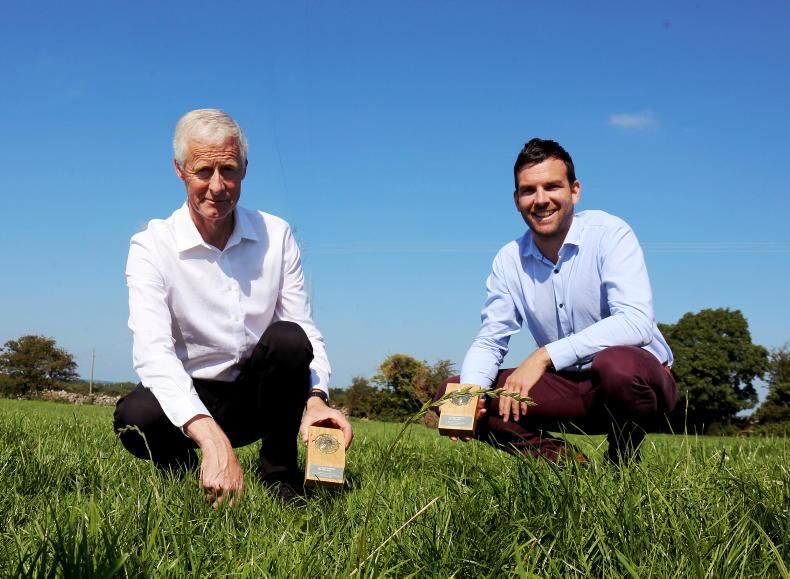

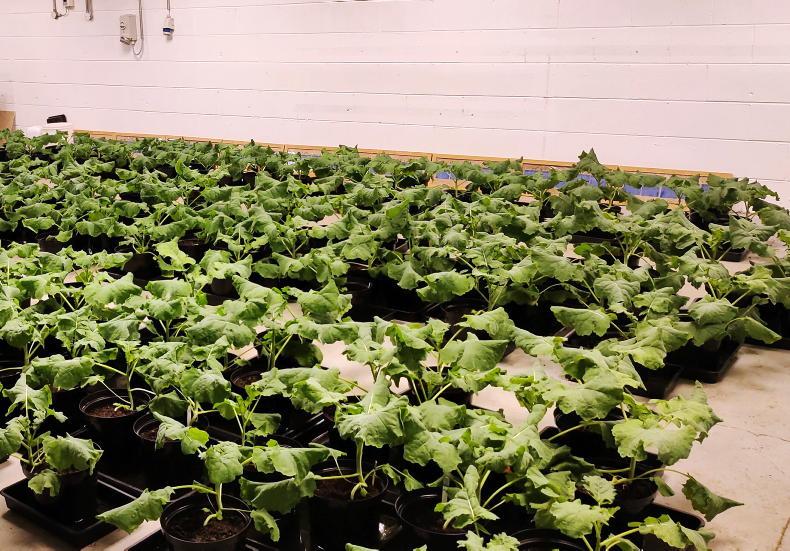

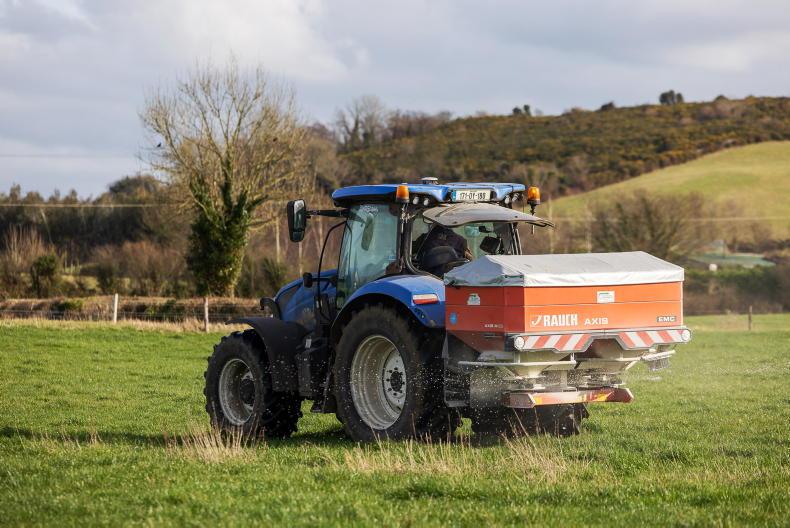

SHARING OPTIONS